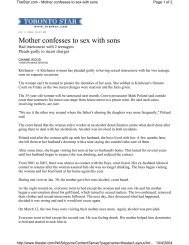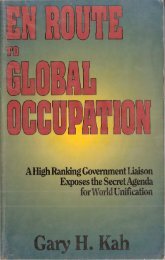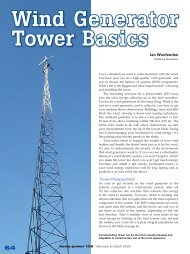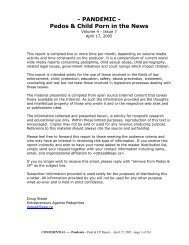G. Edward Griffin - The Fearful Master - PDF Archive
G. Edward Griffin - The Fearful Master - PDF Archive
G. Edward Griffin - The Fearful Master - PDF Archive
You also want an ePaper? Increase the reach of your titles
YUMPU automatically turns print PDFs into web optimized ePapers that Google loves.
Commenting on President Kennedy’s proposals, an article in the Chicago Sun-Times on<br />
March 30, 1961, reported:<br />
It is known that large sections of the President's defense message were<br />
written explicitly for the consumption of top Russian officials. Moreover,<br />
on the recommendation of Charles E. Bohlen, the State Department's<br />
leading expert on Russia, certain Communist phraseology was inserted<br />
in the message. . . . That much of the defense message was directed to<br />
the Soviet leaders is evident in the fact that Llewellyn E. Thompson, Jr.,<br />
ambassador to Russia, was given a special briefing on it. . . . <strong>The</strong><br />
message will now be forwarded to him in Moscow so he can reassure<br />
Soviet officials that the U.S. is taking care not to produce a "first strike<br />
capability." . . . Most of the sessions [at the White House leading up to<br />
the formulation of this policy] were directed by Mr. Kennedy's chief aid,<br />
<strong>The</strong>odore Sorensen, who repeatedly made it clear that the President<br />
wanted to avoid provocative offensive weapons. 15<br />
<strong>The</strong>odore Sorensen was a conscientious objector during the Korean War. 16<br />
As for the Polaris missiles that are now apparently the mainstay of our ability to deter a<br />
surprise nuclear attack: how good are they? Mr. Arthur I. Waskow is the man whom the<br />
U.S. Arms Control and Disarmament Agency has appointed as the expert to draft further<br />
disarmament proposals for the United States. He revealed that in his opinion the Polaris is<br />
not a provocative weapon because it is incapable of attacking an enemy's atomic force.<br />
This is because the megatonnage of the Polaris missile is too limited to damage hardened<br />
missile bases or to knock out a hidden base with a near miss. Waskow also pointed out<br />
that the Polaris, launched at sea with all the difficulties of precise and accurate aiming that<br />
any ship encounters, is incapable of direct hits on mobile missiles. He said that in order to<br />
avoid turning the Polaris into a provocative weapon, the Navy should restrict the number<br />
of its Polaris submarines to no more than 45. Secretary of Defense McNamara has<br />
scheduled construction of a total of 41! 17<br />
As a result of the last series of Soviet underwater tests of the one hundred megaton<br />
bomb, it was revealed that underwater shock waves were so great that they could easily<br />
damage or destroy a submarine anywhere within hundreds of miles. A few such blasts in<br />
waters within striking distance of the relatively short-range Polaris missile could likely wipe<br />
out our entire fleet of submarines deployed there.<br />
Mr. Paul H. Nitze as assistant secretary of defense delivered a speech in 1960 to a group<br />
of business and professional men at Asilomar on California s Monterey Peninsula. In his<br />
speech, which was sponsored by the 6th U.S. Army, the Western Sea Frontier U.S. Navy<br />
and the 4th Air Force, Mr. Nitze advocated that we unilaterally reduce our armaments; that<br />
we scrap all our fixed-base bomber and missile bases; that we place our Strategic Air<br />
Command under NATO direction; and that we inform the United Nations "that NATO will<br />
turn over ultimate power of decision on the use of these systems to the General Assembly<br />
of the UN." 18<br />
When the press reported the substance of these proposals, alarmed citizens began to<br />
write their objections to Washington. Government officials responded by tripping all over<br />
themselves contradicting each other's assurances and denials. For instance, Dr.<br />
Lawrence G. Osborne of Santa Barbara, California, received one reply from the Defense<br />
Department stating flatly that a proposal to turn SAC over to NATO was definitely not


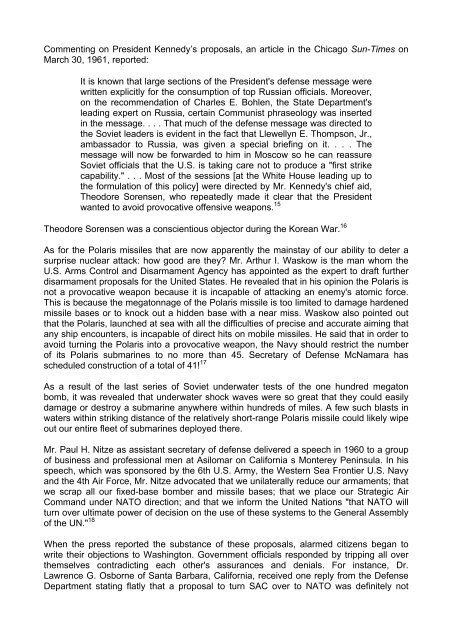
![Robert T McQuaid [rtmq@stn.net] Sent: Friday, October 29, 2004 12 ...](https://img.yumpu.com/51070071/1/190x245/robert-t-mcquaid-rtmqstnnet-sent-friday-october-29-2004-12-.jpg?quality=85)



